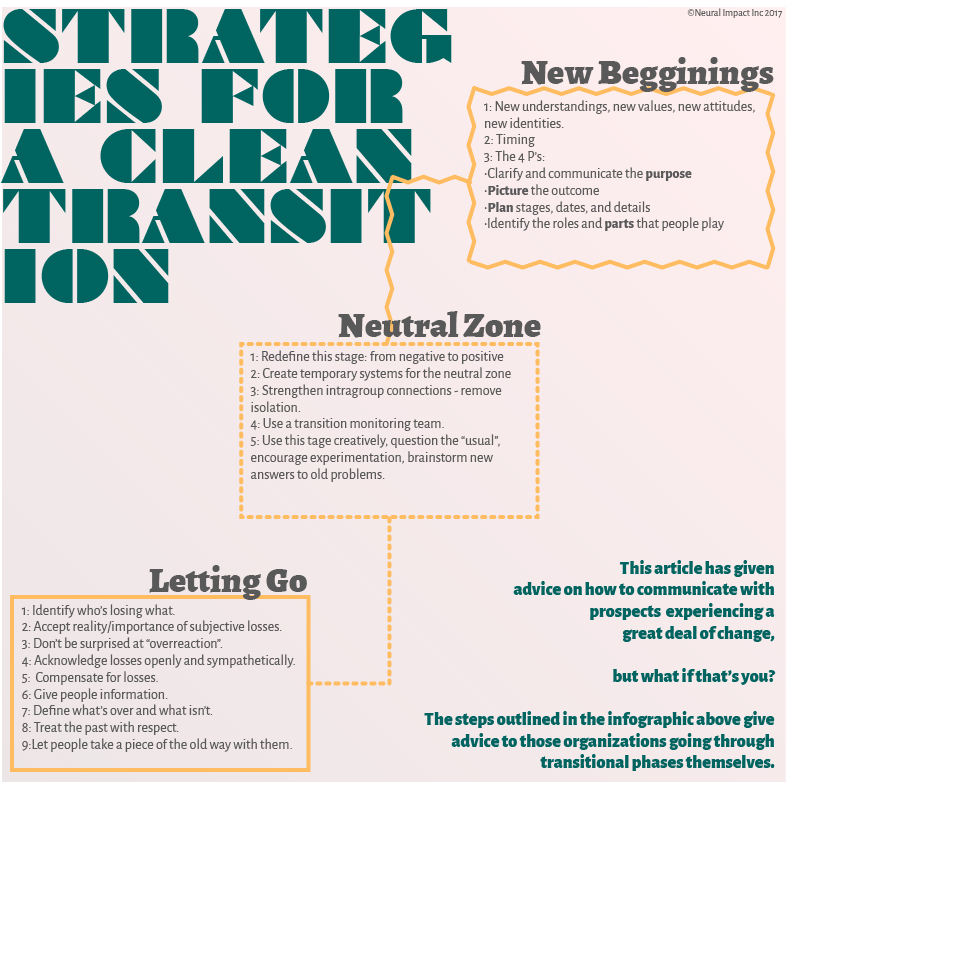
Lessons in Language
October 26, 2017
The Persuasive Power of Rejection
December 22, 2017
You’ve likely heard this a thousand times before, irrespective of your career or position: business has changed. It’s understandable this advice may appear a bit played out to many of us, —à la boy-who-cried-wolf— but this time, the sky might actually be falling. With the introduction of cloud computing into the marketplace in recent years, products and service offerings have in large part vacated the physical premises and evaporated into the digital ether. From there we’ve seen a global sea change of product positioning and marketing, drastic pricing changes, and new sales processes. The irony is that companies do not appear to be adapting to this new system as quickly or thoroughly as one might expect. For those prospects that are in the process of trying to, a behavioural pattern involving 3 transitional phases seems to emerge. Understanding this process is invaluable for you and your business; knowing how individuals and organizations handle change in the marketplace is extremely useful in tailoring your products and solution packages to fit their exact needs.
Endings: Letting Go of the Old
This stage is marked by a letting go of old realities. Here, the previous way of doing things is long gone and our prospect is finally beginning to realize this. In this point we’re often blinded to the fact that these ‘endings’ are merely a first phase in the lengthy process of transition to a new beginning. We are frightened by the uncertainty of change, we fear the unknown, and we desperately yearn for what was once familiar to us— what was comfortable. This stage is often marked by the following behaviours:
1: Disenchantment with the old
2: Disidentification with what was
3: Disengagement from previous models or events
4: Disorientation
As mentioned previously, understanding these emotions and behaviours is crucial for any person or group looking to grow their business. Failure to recognize, comprehend, and react to what prospects are feeling in this phase will easily create considerable resistance throughout the entire sales process.
The Neutral Zone
The neutral zone picks up from the disorientation that results from the ‘ending’ phase. William Bridges, from whose work this model of change has been adapted, claimed this stage serves as a “moratorium from the conventional activity of our everyday existences”. What he meant was that the neutral zone should act as a sort of limbo; it should be a place where we can acclimate to our new environment and our own emotions. In this phase, our old way of doing things, our old reality, has vanished from beneath our noses, but the new reality that lays in its wake is still very difficult to comprehend and adopt. Our prospect’s behaviour is difficult to pin down at this particular stage. For some, the neutral zone stimulates a flurry of activity, as the individual or group attempts to make sense of new experiences and surroundings. For others, lethargy may immediately take hold, as navigation through this new terrain becomes slow and cautious. Regardless, the neutral phase is marked by a slow, internal transition, coupled with an awareness that the future is unclear but the past is most certainly gone.
Recognizing this uncertainty and reacting accordingly is, once again, extremely important to understanding your prospect’s buying behaviour. Try to encourage prospects to see benefits in new ways of thinking and working, and provide a positive sense of direction towards new innovations, processes, and improvements.
The New Beginning
The neutral zone is the phase that does most of the heavy lifting in a prospect’s journey. At some imperceptible point within that phase, old and new realities are differentiated, and necessary information begins to be absorbed. New norms and rules have become crystal clear and necessary changes in behaviour are more-or-less understood. The New Beginning, while seemingly a defined, final stage, is actually a series of coming to terms with all that is new. It is an ongoing process which redefines itself over and over again until it no longer is a beginning. It is the meat of the new life— comfortable, known and accepted.




